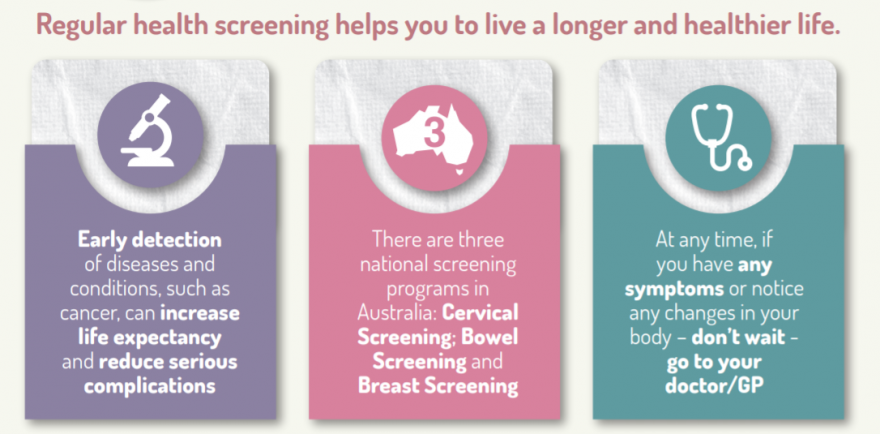Cervical Cancer
The Pap test is now known as the Cervical Screening Test. We encourage everyone eligible to participate in cervical screening.
Important things to know:
- Anyone who has ever been sexually active and has a cervix should have a cervical screening test until age 74. This includes LGBTQI people – see ACON’s information.
- Younger women should commence cervical screening tests at the age of 25
- You can choose to provide a self-collected sample
- If you have had HPV vaccination (Gardasil) you should still participate in the screening program.
Why is cervical screening important?
Cervical screening aims to detect the presence of Human Papilloma Virus (HPV) – this is the virus known to induce changes in cervical cells which could lead to cancer. By identifying HPV, especially the high risk types, we can identify patients who need closer follow up. Since its introduction the program has had a significant impact on the rates of cervical cancer in Australia, but there are still cases diagnosed every year. Those who haven’t had screening in more than 4 years are at higher risk.
How does the test work?
Your doctor can do a speculum exam and use a small brush to collect a sample of cells from the cervix. You can also choose to provide a self-collected sample with a swab. You should discuss this with your doctor.
If your result is negative for HPV, this is regarded as “low risk” result and you will be advised to have screening again after another 5 years.
If your test is positive for HPV, the lab will do further testing to look at the cells and will provide advice about referrals or the optimum timeframe for ongoing monitoring.
What if I have symptoms?
This test is a screening test, which means that it is for a person who does not have any symptoms. If you have any symptoms such as bleeding between your periods or after sex, an irregular menstrual cycle, vaginal discharge or pelvic pain you should come and see a doctor
Regardless of the timing of your cervical screening test, it’s a good idea to discuss sexual health screening with your doctor at any time and at any age if you have ever been sexually active. This is especially the case if you have a new sexual partner. This could include tests for sexually transmitted infections such as chlamydia.
Reminders If you still have questions, please talk to your doctor and plan for your next test. We can put a reminder in our system to email you when it’s due. If you do not want any reminders please let us know.
If you want to opt out of the National Cancer Screening Register you can contact them directly.
Further information
Several organisations have put together more detailed information about the changes, and we are including some useful links below.
Self collection now available for cervical screening
Breast Cancer
Breastscreen invites you to have your first screening mammogram at age 50. The test is recommended for women aged 50-74.
Call 13 2050 to make a booking. You do not need a doctor’s referral.
Breastscreen also offers mammogram screening from age 40, though this can be a less useful screening program at a younger age, and you may wish to discuss with your doctor.
If you are concerned about any breast symptom, or worried because of a family history of breast cancer please make an appointment with us for review, as the usual screening program might not be appropriate.
As well as family history, there are many other factors that can impact on your breast cancer risk, including alcohol consumption and being overweight. You can find out more detail at Your Risk and Breast Cancer
You can read Breastscreen’s Privacy Policy here
Bowel Cancer
The National Bowel Cancer Screening Program (NBCSP) invites eligible people starting at age 50 and continuing to age 74 (without symptoms) to screen for bowel cancer using a free, simple test at home. A kit will be sent to your home (address registered with Medicare), every 2 years according to your date of birth.
Australia has one of the highest rates of bowel cancer in the world. Around one in 23 Australians will develop bowel cancer during their lifetime.
The NBCSP aims to continue to reduce deaths from bowel cancer through early detection of the disease.
It’s not as complicated as it seems – check the video for advice. If you get it wrong, please ask us as we might be able to help out with extra supplies of the test kit components. You can also contact the NSCR if you have lost your Bowel Cancer kit or it has expired.
Results will be sent to your nominated GP and we will follow up the necessary referrals and advise the Register.
If you wish to opt out of the National Bowel Cancer Screening Register, call 1800 627 701 or go online to check their privacy policy.
Prostate Cancer
There is no formal national screening program for Prostate Cancer, but guidelines recommend consideration of a PSA blood test for anyone with a prostate over the age of 50 who has a life expectancy of at least 10 years, and to start screening earlier in people with a family history of prostate cancer. You should discuss testing with your doctor. Other conditions can also increase the level of PSA, so interpreting results is not straightforward. You might be recommended an MRI or Urology assessment to follow up abnormal results.

